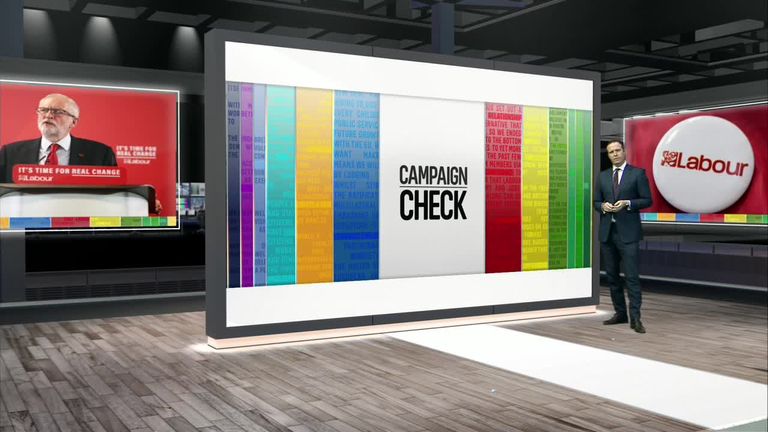Are Labour's 拢83bn spending plans really 'impossible'?
The IFS says it would represent the biggest hike in current spending in peacetime - but how do the manifesto numbers stack up?
Tuesday 26 November 2019 18:19, UK
Labour says its plan for Britain is "full of popular policies" - and that it's the establishment and their supporters who are trying to block it.
A wave of nationalisations, a windfall tax on oil companies and higher taxes for the rich and the corporations - they're all part of what the party calls a "radical and ambitious manifesto".
There will be plenty of people who have their doubts about it - and not just among those "powerful people and their supporters" that Jeremy Corbyn says are trying to stop him.
Mr Corbyn was ready for them.
"Over the next three weeks," he told supporters at the manifesto's launch, "they're going to tell you that everything in this manifesto is impossible, that it's too much for you, because they don't want real change in this country."
But is this manifesto really impossible?
What happens when you get beyond the rhetoric and look at the numbers?
To put it in context, the last time Mr Corbyn was vying for the keys to Number 10 in 2017, Labour were pledging to spend an extra £48.6bn a year by the end of the five-year parliament.
This time round they've gone a lot further, promising that by the 2023-24 financial year, day-to-day spending will be £82.9bn higher than under existing plans.
Some of that will go on education - with £13.6bn earmarked for a higher education funding shake-up that will see tuition fees scrapped and other funds going towards the expansion of free childcare and more school funding.
Then there's £17.7bn set aside for health and social care - with higher funding increases for the NHS and free personal care for over-65s planned.
But how are Labour going to pay for all of this?
The short answer: a lot of taxes.
First, higher income taxes for top earners - those earning £80,000 a year or more.
Labour say this will give them £5.4bn a year more to spend.
But there's something interesting in how they get to that figure.
In theory, these tax changes should be raising £11.4bn.
But Labour acknowledges the theory that such a significant tax rise would provoke a reaction by these higher earning individuals - with some working less, and others moving abroad.
That behavioural factor means the changes, according to the manifesto, raise only half that theoretical amount.
Labour are also raising corporation tax significantly - from 19% to 26% for the biggest companies - though they don't factor in any behavioural change by companies that could eat into the sums they hope to raise from that.
Taken together with a shake-up of taxes on multinationals such as Facebook, it puts businesses on the hook for £30bn in new taxes.
Then there's £14bn from changes to capital gains tax and taxes on dividends - altogether a big levy on investment incomes.
Here it's worth coming back to Mr Corbyn's pledge that there will be no tax increases for 95% of taxpayers - with business and the wealthy the main targets as he seeks to raise funds.
That is true for income tax but the IFS, the respected economic think tank, takes issue with the broader claim.
For one thing, they say, scrapping the marriage allowance - a tax break largely for people who are not in the higher income tax bracket - will affect people who are in that 95% majority.
Then there are those changes to taxes on investment incomes, which could affect anyone who holds shares, not just the richest.
The IFS also points to the impact that increasing corporation tax, indirectly, could have on individuals - since those companies affected may choose to pay their workers less or increase prices for consumers.
And don't forget, so far we've been talking about just day-to-day spending.
There's also the two big funds totalling £400bn, paid for by borrowing, that Labour say will go on big infrastructure projects.
They include building a million homes over the next decade, as well as spending on schools and hospitals.
And what of Labour's plans to nationalise Royal Mail, the railways and water companies?
They say these will cost nothing, since as the government will be acquiring an asset it will not add to the national balance sheet.
But in the small print of the manifesto there is an admission that it could cost some money.
Added together it's certainly a radical programme.
In fact, according to the IFS, it would be the biggest current spending increase in peacetime.
It is certainly possible. But it is very expensive.
Campaign Check scrutinises election claims made by political parties, examining if they are true or false, and the context. Sky News is working with Full Fact - the leading independent fact-checking charity.
The Brexit Election on Sky News - the fastest results and in-depth analysis on mobile, TV and radio.
- Watch Dermot Murnaghan live from 9pm on 12 December
- See the exit poll at 10pm
- Watch KayBurley@Breakfast election special on 13 December
- Find out what happens next in All Out Politics special from 9am with Adam Boulton






